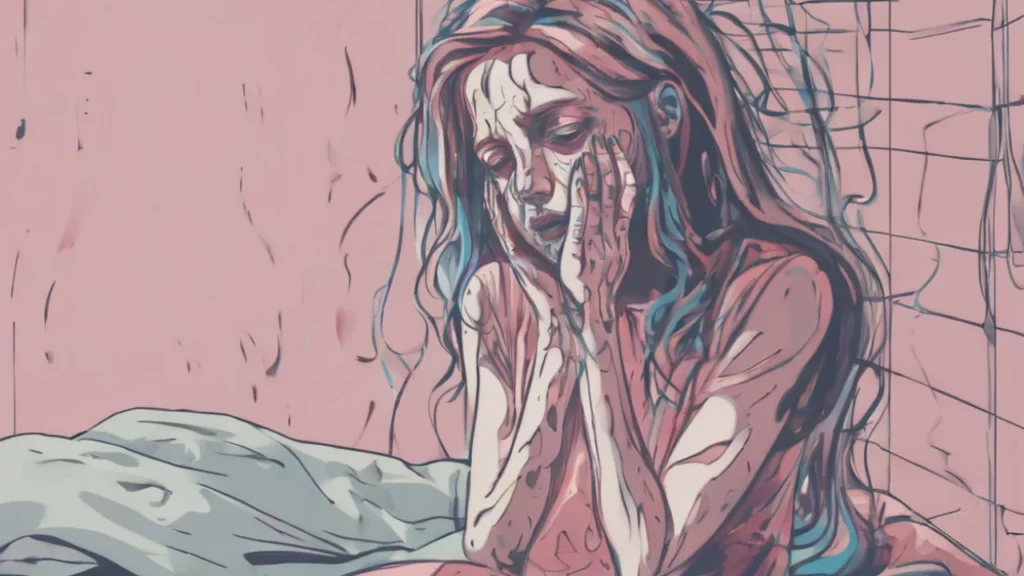Are Vivid dreams a sign of mental illness? not really, they hold personal or spiritual significance; for others.
Are Vivid Dreams a Sign of Mental Illness?
Vivid dreams are a natural part of sleep and are not considered a sign of mental illness. They may reflect inner anxieties, stress, or past experiences, but on their own, they do not confirm a diagnosis of a mental disorder. Mental health professionals emphasize that for vivid dreams to be considered in clinical assessments, they must co-occur with other symptoms affecting behavior, mood, or cognition.
What are Vivid Dreams?

Vivid dreams are defined by their intense lifelike qualities, with vivid colors, intricate details, and powerful emotions. Unlike typical dreams, they are remembered with greater clarity and can sometimes feel indistinguishable from reality. Vivid dreams primarily occur in the REM (Rapid Eye Movement) phase of sleep, where brain activity is highest, similar to that of wakefulness.
What are the Benefits of Vivid Dreams?
Interestingly, vivid dreams are tools for emotional and mental processing. Studies suggest that dreams help us to work through emotions, find creative solutions to problems, and develop insights. 63% of people report gaining new perspectives from their dreams. Far from being solely distressing, vivid dreams can allow individuals to confront and understand inner conflicts, fostering a richer mental life.
Powerful Scientific, Psychological, Spiritual & Biblical Facts
Scientific Facts
- Vivid dreams occur primarily during REM (Rapid Eye Movement) sleep, a phase constituting about 20-25% of total sleep in adults.
- During REM sleep, brain activity spikes to levels similar to wakefulness, activating areas linked to memory, emotion, and vision.
- A study estimates that 55% of adults experience vivid dreams at least once per month, often correlating with intense emotional states.
- Medications, including antidepressants, are known to amplify dream vividness, with reports showing a 17% increase in dream recall among users.
- Stress and sleep deprivation intensify dream clarity, as these conditions heighten brain activity in the amygdala, our emotional center.
Psychological Facts
- Sigmund Freud posited that dreams serve as outlets for repressed desires, especially manifesting unresolved inner conflicts.
- According to Carl Jung, vivid dreams tap into the “collective unconscious,” offering symbolic insights shared across humanity.
- Approximately 50% of people have experienced lucid dreaming, where one becomes aware of dreaming and may even influence dream events.
- Vivid nightmares can signal trauma, with studies indicating PTSD patients are 2-4 times more likely to encounter them.
- High creativity correlates with vivid dreams; artists, for instance, report frequent and intensely visual dream content, per 2013 research.
Spiritual Facts
- Many spiritual traditions view vivid dreams as divine messages, with 80% of people in a global survey considering dreams spiritually meaningful.
- Indigenous cultures often regard vivid dreams as ancestral communication, guiding major life decisions and actions.
- In Christianity, dreams are seen as spiritual pathways, with vividness symbolizing the clarity of the message from the divine.
- In Islam, significant dreams are categorized as “Ru’ya” (visions), believed to reflect guidance or warnings from Allah.
- Hinduism perceives vivid dreams as manifestations of past life memories or spiritual insight, shaping karma and personal evolution.
Biblical Facts
- Biblical figures like Joseph and Daniel received life-altering dreams, showcasing God’s guidance through vivid visions (Genesis 37, Daniel 2).
- Jacob’s dream of a ladder between Heaven and Earth illustrated divine access, symbolizing God’s promise of protection (Genesis 28:12-15).
- Dreams are mentioned over 20 times in the Bible, each instance representing a significant message, prophecy, or spiritual lesson.
- Prophet Joel foretold an era when God would speak through visions and dreams, reinforcing the importance of dream messages (Joel 2:28).
- The Bible distinguishes “God-given dreams” as uniquely vivid, delivering explicit guidance or revelations intended to direct one’s spiritual path.
Scientific and Psychological Theories
In modern psychology, several theories attempt to decode the purpose and origin of dreams, including vivid ones. Two significant theories offer contrasting perspectives on vivid dreams:
Activation-Synthesis Theory
posits that dreams are simply a byproduct of random brain activity during REM sleep, suggesting that vivid dreams are not necessarily indicative of mental illness but rather a reflection of heightened neural activity.
Continuity Hypothesis
proposes that dreams are influenced by our daily lives, emotions, and thoughts. According to this view, vivid dreams may represent stress, unresolved conflicts, or emotional turmoil, rather than being symptoms of psychological disorders. Research on REM sleep supports these theories, showing that high activity in the amygdala—the brain’s emotional center—during REM may result in more emotionally intense and vivid dreams. Approximately 55% of adults experience occasional vivid dreams, indicating that, while common, they do not inherently signal a mental health issue.
Vivid Dreams and Mental Health Disorders

While vivid dreams are not necessarily linked to mental illness, correlations have been observed in individuals with certain mental health conditions. Disorders such as depression, anxiety, and post-traumatic stress disorder (PTSD) are associated with frequent and often distressing vivid dreams.
- Depression and Anxiety: Research suggests that people with depression and anxiety disorders may experience vivid dreams more frequently due to heightened emotional processing. Vivid, distressing dreams often mirror their waking fears and emotional struggles.
- PTSD: For those with PTSD, vivid dreams, particularly nightmares, may reflect traumatic experiences, occurring in 80% of PTSD cases. These dreams often play out trauma in haunting, recurrent scenarios, highlighting unresolved inner conflict.
- Bipolar Disorder: During manic or depressive episodes, individuals with bipolar disorder may experience intense, vivid dreams. These episodes often amplify emotional sensitivity, which can result in dream imagery that’s both vibrant and disorienting.
This relationship suggests that while vivid dreams are not a direct indicator of mental illness, they can be symptomatic of psychological conditions, particularly when accompanied by other symptoms, such as mood instability or intrusive thoughts.
The Neurobiological Explanation
Neurobiology provides additional insight into the mechanisms behind vivid dreams. Neurotransmitters, particularly serotonin and dopamine, are integral to the regulation of mood and sleep. Alterations in these chemicals, often seen in conditions like depression and schizophrenia, can affect sleep patterns and intensify dream states.
Studies show that REM sleep patterns in individuals with depression and anxiety often deviate from the norm, resulting in dream sequences that are more intense and emotionally charged. This disruption of the brain’s neurotransmitter balance may explain why individuals with mental health concerns experience vivid dreams more frequently.
Vivid Dreams as a Reflection of Stress or Trauma
For those without clinical mental health conditions, vivid dreams may arise as a response to stress or traumatic events. The subconscious mind often seeks to process unresolved emotions, which can lead to vivid, unsettling dreams. Trauma survivors, for example, may encounter repetitive, vivid dreams of distressing events, as if their minds are attempting to “replay” the trauma to find closure.
Religious and Cultural Perspectives

Cultural and religious perspectives provide alternative interpretations for vivid dreams, often viewing them as messages, guidance, or omens rather than symptoms of illness.
Christianity
In Christian tradition, vivid dreams are sometimes seen as divine communication. Biblical figures, such as Joseph in the Old Testament, received guidance through dreams, suggesting that vivid dreams could be messages rather than symptoms of illness.
Islam
Islamic beliefs often differentiate between “true” dreams, which may hold meaning and ordinary dreams. Some vivid dreams are considered potential warnings or insights, to be approached with reflection rather than alarm.
Eastern Traditions
In Buddhism and Hinduism, vivid dreams are regarded as part of spiritual growth or karmic exploration, reflecting life’s lessons and inner truths.
Indigenous Beliefs
Among Indigenous cultures, dreams are often seen as pathways to communicate with ancestors or spiritual beings. Vivid dreams, therefore, carry sacred value rather than pathological implications.
When to Seek Help for Vivid Dreams?
While vivid dreams are harmless, they signal for support if they become disturbing or interfere with daily life. Those experiencing persistent nightmares heightened anxiety, or lack of restful sleep due to vivid dreams should consider consulting a mental health professional. Methods such as cognitive behavioral therapy (CBT) and imagery rehearsal therapy (IRT) have proven effective in reducing the frequency and intensity of distressing dreams, particularly for individuals with PTSD or chronic nightmares.
Conclusion
Vivid dreams occupy a complex space between imagination, memory, and subconscious processing. They are not inherently indicators of mental illness but are windows into our emotions, life experiences, and sometimes even our spiritual beliefs. Whether they reflect stress, mental health, or personal growth, vivid dreams are a shared human experience that can offer insight into both the mind and soul.
FAQs
What are vivid dreams?
Vivid dreams are highly detailed, lifelike dreams that often feel intense and are remembered with clarity. They typically occur during the REM phase of sleep, where brain activity is high and emotions are heightened.
Are vivid dreams normal?
Yes, vivid dreams are a normal experience and are common among people of all ages. About 55% of adults experience occasional vivid dreams, which do not indicate a mental health issue on their own.
Can vivid dreams be a sign of mental illness?
While vivid dreams alone are not a direct indicator of mental illness, they can sometimes be associated with mental health conditions like anxiety, depression, PTSD, and bipolar disorder. In such cases, vivid dreams may reflect unresolved emotional conflicts or traumatic experiences.
What causes vivid dreams?
Vivid dreams can be caused by multiple factors, including stress, trauma, mental health conditions, and sleep disorders. Changes in neurotransmitters like serotonin and dopamine may also contribute to intense dream experiences.
Do certain medications cause vivid dreams?
Yes, some medications, especially antidepressants, beta-blockers, and sleep aids, can increase the likelihood of vivid dreams due to their effects on brain chemistry and sleep patterns.
Are vivid dreams always negative?
No, vivid dreams can range from pleasant to distressing. While some vivid dreams are nightmares, others may be emotionally neutral or even positive, reflecting creative ideas or resolving emotional issues.
Can vivid dreams have a deeper meaning?
Many cultural and religious traditions view vivid dreams as meaningful or spiritual. For instance, Christianity, Islam, Buddhism, and Indigenous beliefs often interpret vivid dreams as messages or insights rather than symptoms of a mental disorder.
How do vivid dreams differ from regular dreams?
Vivid dreams stand out for their sensory richness and emotional impact, making them more memorable than regular dreams. Regular dreams are often vague and harder to recall, while vivid dreams can feel lifelike and stay in the memory for longer.
Are there any benefits to vivid dreams?
Yes, vivid dreams can facilitate emotional processing, help individuals work through complex feelings, and even inspire creativity or new insights. Some people report personal growth or problem-solving breakthroughs after experiencing vivid dreams.
When should I seek help for vivid dreams?
If vivid dreams are frequent, distressing, or interfere with daily life, it may be beneficial to seek help from a mental health professional. Treatments like cognitive behavioral therapy (CBT) and imagery rehearsal therapy (IRT) can help reduce the impact of distressing dreams.


